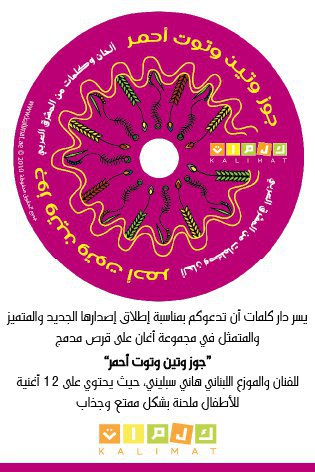Sharjah International Book Fair 29th Edition

- #shjibf Sharjah International Book Fair #shjibf
- Sharjah, United Arab Emirates
- ExpoCenter 7th - 17th November, 2012. Hours | Saturday - Thursday: 10a.m. - 10p.m.; Friday: 4p.m - 10p.m.
Sunday, 31 October 2010
جوز و تين و توت أحمر and Why Singing Builds Literacy | Read Kutub KIDS
 I am back at home—many thanks to Sharjah book-festival organizers for having me and to my family for allowing me to be away!—and my boys are delighting in their new books, Arabic-education materials, and…CDs!
I am back at home—many thanks to Sharjah book-festival organizers for having me and to my family for allowing me to be away!—and my boys are delighting in their new books, Arabic-education materials, and…CDs!
This morning before school, the boys had a chance to listen to Fatima Sharafeddineand Hani Siblini‘s first-ever collaborative children’s CD. The seven-year-old is not a morning person (so it’s quite something for him to enjoy music in the morning!), and the two-year-old, who does like mornings, was already singing along.
I love the fun lyrics, the repetition, the assonances, and the catchy tunes (I can’t seem to get the song طير و علي out of my head!)
And, lest we forget, singing to children is a very important way to develop their language skills. Parent and Child magazine notes that singing is sometimes overlooked in literacy education, but it’s an important component, as strong readers and writers must be able to “play” with language.
It makes me want an Arabic children’s radio station here in Cairo. (Yes, yes, I know, you give me an inch and suddenly I want a kilometer….)
‘So Much Survives the Process of Translation’ � Arabic Literature (in English)
 Yes, it’s Halloween, but it’s also nearly time for this year’sArab-focused London Poetry Festival. Spooooky!
Yes, it’s Halloween, but it’s also nearly time for this year’sArab-focused London Poetry Festival. Spooooky!
British poet Fiona Sampson, a non-Arab who’s scheduled to appear at the festival, recently spoke withThe National about how she perceives attitudes toward poetry in Britain vs. in the Arabic-listening world. (Her take: In the Arab world poetry’s central; in the British world it’s seen as “the most flowery and the least responsible” of the genres.)
I agree that, yes, poetry has traditionally been the “diwan of the Arabs,” and, yep, Mahmoud Darwish did pack stadiums. But—while I don’t agree with critic Rasheed al-Enany that poetry and fiction have completely switched places in the Arabic soul—poetry, particularly modernist or “prose poetry,” is commanding less attention.
For instance, the big new lit prize, the “Arabic Booker,” is for fiction, not poetry. And most of the writers in the Beirut39 collection were represented by their prose.
That’s only some places, mind you. In the media room at the Sharjah International Book Fair, reporters were most keen on the evening poetry events. And, of course, the Million’s Poet show still attracts millions of viewers.
Sampson, clearly a fan of Arabic poetry, called it “much more flexible” than English poetry. She told The National that even when (good) Arabic poetry is not read in the original language, “so much survives the process of translation. There’s still something very evocative and strong there.” I’d like to stick another “good” in before the word translation.
Among the poets who’ll be reading at the London Poetry Festival are Nujoom al Ghanem, Fadhil Al Azzawi, Suheir Hammad, Mourid and Tamim Barghouti, Adonis, and others. (Find a fuller rundown here.)
There are also non-Arabs, of course, including English writer Simon Armitage and the British poet laureate Carol Ann Duffy.
People who might attend and write about events as they happen:
- London-based poet and blogger Ghazi Gheblawi ?
- Whoever writes for the Southbank Centre’s twitter feed ?
- Another Southbank Centre tweeter, @litweeter ?